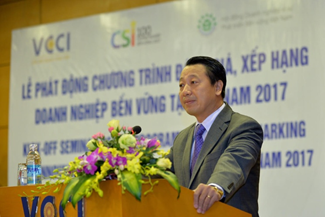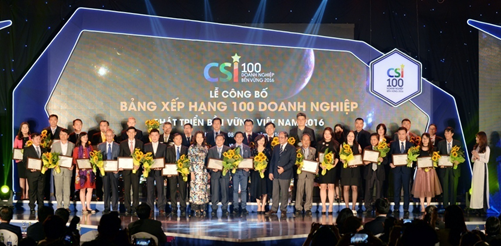

09/01/2018
Following the successful Vietnamese Sustainable Business Ranking Programme 2016, the 2017 programme award will be held in December. The annual programme is organized to honour enterprises that take the lead and make achievements in the field of environmental protection. On this occasion, the Vietnam Environment Administration Magazine (VEM) has talked to Mr. Nguyễn Quang Vinh, Deputy Secretary-General of the Vietnam Chamber of Commerce and Industry (VCCI) and the Vice Chairman and Secretary-General of the Vietnam Business Council for Sustainable Development (VBCSD), about new features in the programme this year.
 |
| Mr. Nguyễn Quang Vinh Deputy Secretary General of VCCI, Vice Chairman and Secretary General of VBCSD |
VEM: After the first Vietnamese Sustainable Business Ranking Programme held in 2016, what has VCCI done to assess corporate performances and efforts in environmental protection?
Mr. Nguyễn Quang Vinh: At the moment, environmental protection is one of the major concerns for businesses, and it has been included in the business governance and development strategies. Lots of companies such as Bảo Việt Holdings, Vingroup, Heineken Việt Nam and Unilever Việt Nam have had long-term plans, foreseen and seized the opportunities from future development trends, and made great efforts to carry out environmental protection activities.
As one of the businesses that have been working actively on environmental protection issues, Bảo Việt Holdings was the first to develop the Sustainable Development Report on the request of the Global Reporting Initiative (GRI). The group developed the Vietnamese version of GRI, which is more practical and friendly for firms. Besides such efforts, the company has made some achievements, for example, it posted a record revenue growth rate of 27.5% in the first quarter of 2017, was listed among Vietnam’s top 50 profitable firms and topped the insurance-finance sector for 5 consecutive years. These achievements have shown the company’s success when it combined environmental protection activities with its business operation.
VEM: What are the new features of the 2017 programme?
Mr. Nguyễn Quang Vinh: It can be said the first programme in 2016 was a success, which drew the attention and support of the Government, the National Council for Sustainable Development and Competitiveness Improvement, ministries, sectors, domestic and foreign institutions, and the Vietnamese community. About 400 firms in the production and trade sectors participated in the programme, and 100 of them were recognized and honoured.
It was the foundation that helped us promote the programme into an annual and reliable activity for local businesses. The 2017 programme includes some new features such as the Corporate Sustainability Index (CSI) 2017, which is easy to understand for local companies, and more small- and medium-sized enterprises are expected to participate in this year’s programme, as 98% of the Vietnamese firms are categorized in this segment. CSI criteria not only are understandable and familiar for local companies but also enable them to carry out self-evaluation and help experts assess accurately the firms’ accomplishment of sustainable development, by updating domestic and international regulations, and adding some extra criteria on circular economy, children rights and decision-making decentralization in the regulations of local businesses.
Compared with the 2016 programme when local companies were only able to submit their print applications, the organizer board in 2017 has developed an online application software to reduce procedures and expenses for companies. In addition to this, an online application is considered a tool for a company to keep track of its operational progress and changes year by year.
 |
| The award ceremony of the Vietnamese Sustainable Business Ranking Progamme 2016 |
VEM: How can companies take part in the programme, and how are they supported after the programme finishes?
Mr. Nguyễn Quang Vinh: All legal, profitable and voluntary companies and businesses in the country can participate in the programme. Following the programme launching ceremony held in April, the VBCSD will cooperate with Deloitte Việt Nam Limited Liability Company to organize training courses for companies in July, so that they can better understand the importance of corporate governance and the CSI to their sustainable development, and help them carry out more precise evaluations on their sustainable development business activities.
A required programme application contains an application letter, the business-assessed CSI, and related materials, records, information and photos. As mentioned earlier, companies can choose to submit either print or online applications to the organizer before September 30, 2017. After the programme, companies will be able to connect with each other, seek new investment and cooperation opportunities. They will also receive advice and support from the programme consultants.
VEM: Some said that very few State-owned enterprises took part in the first programme in 2016. What have you done to encourage all types of business to join the programme this year?
Mr. Nguyễn Quang Vinh: In the context of globalization, sustainable development is no longer a term, it has become a development trend for all economies. When Việt Nam makes deeper integration into the global economy and signs more regional and international trade agreements, it is essential for the country to improve the quality of corporate governance and competitiveness for local companies, so that they can seize rising opportunities and catch up with the trend of sustainable development around the world.
Local businesses are not obliged to take part in the programme to develop sustainably; however, they will receive a lot of benefits by participating in the programme. At the moment, the number of companies that are aware of sustainable development is still limited. Most of them are big corporations, groups and multinational corporations. By participating in the programme, small- and medium-sized businesses may use the CSI-based evaluation to review their current conditions, address potential risks and seize new opportunities. If they are honoured by the programme and recognised by the Government, their names will rise in the eyes of investors and stakeholders, and they will be able to attract more investment and receive more cooperation opportunities.
VEM: How different is the CSI developed by VCCI from the CSI developed by other countries? What did you learn from other countries while developing Vietnam’s CSI?
Mr. Nguyễn Quang Vinh: CSI is the first index developed and designed for Vietnamese companies. It means the criteria were developed keeping in mind both international practices and Vietnam’s particular socio-economic conditions.
There are now two CSI that are used by many organizations and companies in the world, which are the Global Reporting Initiative Standards (GRI) used to develop sustainable development reports, and the International Integrated Reporting Council (IIRC) used to develop integrative reports.
VEM: What supportive policies Việt Nam should have to encourage and push local businesses to achieve sustainable development?
Mr. Nguyễn Quang Vinh: Developing a sustainable business community should be the chief concern of both Government and local businesses. On the one hand, Government agencies and VCCI are working hard to implement the Government’s resolutions 19/2016/NQ-CP and 35/NQ-CP to create a fair, favourable business environment for local companies. Besides this, the VCCI and VBCSD often organize activities to train and educate local companies, and raise their awareness on sustainable development and good international practices on the matter, as well as new business models, such as circular economy and low-cost business.
On the other hand, local companies should study and improve the quality of corporate governance, change their business ideologies that focus on profits and take environment, human and society for granted. Those companies should understand that sustainable development is not an unrealistic term but an instrument to bring them long-term prestige, opportunities and profits. Statistics of the Business and Sustainable Development Commission show that if companies include the issue of sustainable development in their core strategies, the accomplishment of 17 Sustainable Development Goals will offer $12 trillion worth of market for the four sectors, which are food and agriculture, urban area development, energy and materials, and healthcare and medical services. In terms of all sectors, the economic potential offered by sustainable development will exceed the number of $12 trillion.
If a company chooses to make its business sustainable, putting ahead long-term benefits in the economy, environment and society over short-term benefits that could harm the future, it is placing a firm foundation for its future development and reaching beyond the local market to the region and the world.
VEM: Thank you!
Phạm Đình (Implemented)